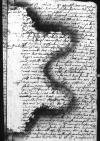Aus E(wer) H(erlichkei)t ⌊⌋ und aus den copeyen dar bey on the margin⌈und aus den copeyen dar beyund aus den copeyen dar bey on the margin⌉, / das wir gestrigs tags erhaltn(n), / hab wir vorstanden(n), wie die sache mit der zceisen ein gestalt wil gewynnen(n), / nemlich so der h(e)r ⌊Pomrelsche woywod⌋ mit ⌊den von ⌊Thorn(n)⌋⌋, E(wer) H(erlichkei)t ⌊eldsten⌋ und ⌊den vom(m) ⌊Elbing⌋⌋ kein antwurt gegeben(n) und helt sich also, / om(n)e regnu(m) in se divisu(m) etc., wo ouch ein teil sein eigen(n) / und das ander den gemeinen(n) nucz vorso[...] paper damaged⌈[...][...] paper damaged⌉ wil sichs nicht gleich gleich zcyhen. / Der weg(en) wisse wir nicht sonders E(wer) H(erlichkei)t ⌊eldsten(n)⌋ zu roten(n), / dan, / so die andren vorgenanten(n) darzu vorwilten(n), / das ⌊ko(nigliche)r m(ajeste)t⌋, u(nsers) a(llergnedigsten) h(e)rn, uff die form(m) geschriben(n) wurd, / wie der hochwirdige ⌊h(e)r von ⌊Colmesze⌋⌋, das E(wer) H(erlichkei)t villeicht weis on the margin⌈das E(wer) H(erlichkei)t villeicht weisdas E(wer) H(erlichkei)t villeicht weis on the margin⌉, begriffen(n), / do mit am(m) hove vormerck, / das wir ouch uff uns superinscribed⌈unsuns superinscribed⌉ selbst achtung habn(n). / Wirt dis vorbleibn(n), / der hoff wirt nicht noch lossen weiter zu greiffen etc. Das gelt under uns gefalln(n) leit zum ⌊Braunsberge⌋, / darnoch wir sehen, wie sich der mherer teil wirt schicken(n), wolle wir uns ouch richten(n). / Hiebey findt E(wer) H(erlichkei)t, was uns das ⌊Beyn⌋ geschribn(n), und unser antwurt. / Wir warten(n) alle und disse stunde unsers written over (n)⌈(n)ss written over (n)⌉ botens written over (n)⌈(n)ss written over (n)⌉ von hove, / do hyn wir den XXII des negst on the margin⌈negstnegst on the margin⌉ vorgangen(n) monts weitlofftig geschribn(n). / H(e)r ⌊Fabian Woynowski⌋ hot uns hie angeczeigt unser ⌊g(nedigs)t(en) frawen(n)⌋ befhel, / das sich dohin streckt wie zuvor, / das alle dink hie von uns flissen(n) und in unserm(m) rothe nymant besser sey dan ⌊Pomerellen(n)⌋ und ⌊Strosberg⌋, / wie sol es dan recht bey uns zu ghen(n) etc. Es hot uns ouch der h(e)r deckent von ⌊Krako⌋ ⌊Maczyeowski⌋ ⌊⌋ und getrost, wir solln(n) uns nichts lossen(n) anfechtn(n), / ⌊ko(niglich)e m(ajeste)t⌋ sey unser gnedigster h(e)r etc. Was das burgraff ampt betrifft, / wolle wir, so bald unser bot von hove an uns gelangt, / nicht vorgessen(n) un(n)d alles thun, / wie zuvor E(wer) H(erlichkei)t von uns erfaren(n) etc. Von ⌊ro(mische)r ko(nigliche)r m(ajeste)t⌋ hove hab wir kein antwurt, / wollen abermols schreibn(n). / Wer gut, / so das gemelde und instruction(n) villeicht vorloren(n), / das uns E(wer) H(erlichkei)t anders zuschickte etc. E(wer) H(erlichkei)t svacheit, / und  AAWO, AB, D. 7, f. 83v das die sich so offte vornewet, / bringt uns bekömern. / E(wer) H(erlichkei)t wolde sich selbst nicht absthen(n) und ir gesuntheit fleis haben(n), / darinnen Got E(wer) H(erlichkei)t zu langen(n) zceitn(n) wolle vorhalten(n) etc. Die meynung ⌊ko(nigliche)r m(ajeste)t⌋ zu schreibn(n), / vorsorgung des ports, / wolle wir im korczen vortstellen. Newe zceitung(en) hab wir h(ern) Fabian E(wer) H(erlichkei)t zu schreib(en) befolen(n). / Unser ohm(m) Simon(n) bit E(wer) H(erlichkei)t uff sein ehefreudt gen Wartenberg / den negstn(n) suntag, / do hin wir uns mit der hulff Gots morg(en) begeben(n) etc. adscribed⌈Newe zceitung(en) hab wir h(ern) ⌊Fabian⌋ E(wer) H(erlichkei)t zu schreib(en) befolen(n). / Unser ohm(m) ⌊Simon(n)⌋ bit E(wer) H(erlichkei)t uff sein ehefreudt gen ⌊Wartenberg⌋ / den negstn(n) suntag[1], / do hin wir uns mit der hulff Gots morg(en) begeben(n) etc.Newe zceitung(en) hab wir h(ern) Fabian E(wer) H(erlichkei)t zu schreib(en) befolen(n). / Unser ohm(m) Simon(n) bit E(wer) H(erlichkei)t uff sein ehefreudt gen Wartenberg / den negstn(n) suntag, / do hin wir uns mit der hulff Gots morg(en) begeben(n) etc. adscribed⌉ Hie bey dissen briff an unsern(n) vortrawtn(n) freunt hidden by binding⌈[eunt]eunt hidden by binding⌉, den h(e)rn ⌊Danczker castellan(n)⌋ wolt bestellen. Got in sein gnad mit al den iren(n), / welche die unsern(n) alle vil dinst und guts entpittn(n), / befolen.
AAWO, AB, D. 7, f. 83v das die sich so offte vornewet, / bringt uns bekömern. / E(wer) H(erlichkei)t wolde sich selbst nicht absthen(n) und ir gesuntheit fleis haben(n), / darinnen Got E(wer) H(erlichkei)t zu langen(n) zceitn(n) wolle vorhalten(n) etc. Die meynung ⌊ko(nigliche)r m(ajeste)t⌋ zu schreibn(n), / vorsorgung des ports, / wolle wir im korczen vortstellen. Newe zceitung(en) hab wir h(ern) Fabian E(wer) H(erlichkei)t zu schreib(en) befolen(n). / Unser ohm(m) Simon(n) bit E(wer) H(erlichkei)t uff sein ehefreudt gen Wartenberg / den negstn(n) suntag, / do hin wir uns mit der hulff Gots morg(en) begeben(n) etc. adscribed⌈Newe zceitung(en) hab wir h(ern) ⌊Fabian⌋ E(wer) H(erlichkei)t zu schreib(en) befolen(n). / Unser ohm(m) ⌊Simon(n)⌋ bit E(wer) H(erlichkei)t uff sein ehefreudt gen ⌊Wartenberg⌋ / den negstn(n) suntag[1], / do hin wir uns mit der hulff Gots morg(en) begeben(n) etc.Newe zceitung(en) hab wir h(ern) Fabian E(wer) H(erlichkei)t zu schreib(en) befolen(n). / Unser ohm(m) Simon(n) bit E(wer) H(erlichkei)t uff sein ehefreudt gen Wartenberg / den negstn(n) suntag, / do hin wir uns mit der hulff Gots morg(en) begeben(n) etc. adscribed⌉ Hie bey dissen briff an unsern(n) vortrawtn(n) freunt hidden by binding⌈[eunt]eunt hidden by binding⌉, den h(e)rn ⌊Danczker castellan(n)⌋ wolt bestellen. Got in sein gnad mit al den iren(n), / welche die unsern(n) alle vil dinst und guts entpittn(n), / befolen.
 AAWO, AB, D. 7, f. 83v das die sich so offte vornewet, / bringt uns bekömern. / E(wer) H(erlichkei)t wolde sich selbst nicht absthen(n) und ir gesuntheit fleis haben(n), / darinnen Got E(wer) H(erlichkei)t zu langen(n) zceitn(n) wolle vorhalten(n) etc. Die meynung
AAWO, AB, D. 7, f. 83v das die sich so offte vornewet, / bringt uns bekömern. / E(wer) H(erlichkei)t wolde sich selbst nicht absthen(n) und ir gesuntheit fleis haben(n), / darinnen Got E(wer) H(erlichkei)t zu langen(n) zceitn(n) wolle vorhalten(n) etc. Die meynung 
